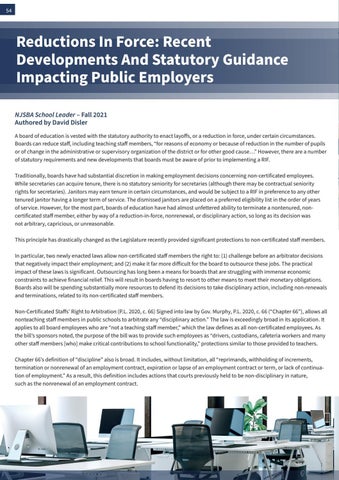54
Reductions In Force: Recent Developments And Statutory Guidance Impacting Public Employers NJSBA School Leader – Fall 2021 Authored by David Disler A board of education is vested with the statutory authority to enact layoffs, or a reduction in force, under certain circumstances. Boards can reduce staff, including teaching staff members, “for reasons of economy or because of reduction in the number of pupils or of change in the administrative or supervisory organization of the district or for other good cause…” However, there are a number of statutory requirements and new developments that boards must be aware of prior to implementing a RIF. Traditionally, boards have had substantial discretion in making employment decisions concerning non-certificated employees. While secretaries can acquire tenure, there is no statutory seniority for secretaries (although there may be contractual seniority rights for secretaries). Janitors may earn tenure in certain circumstances, and would be subject to a RIF in preference to any other tenured janitor having a longer term of service. The dismissed janitors are placed on a preferred eligibility list in the order of years of service. However, for the most part, boards of education have had almost unfettered ability to terminate a nontenured, noncertificated staff member, either by way of a reduction-in-force, nonrenewal, or disciplinary action, so long as its decision was not arbitrary, capricious, or unreasonable. This principle has drastically changed as the Legislature recently provided significant protections to non-certificated staff members. In particular, two newly enacted laws allow non-certificated staff members the right to: (1) challenge before an arbitrator decisions that negatively impact their employment; and (2) make it far more difficult for the board to outsource these jobs. The practical impact of these laws is significant. Outsourcing has long been a means for boards that are struggling with immense economic constraints to achieve financial relief. This will result in boards having to resort to other means to meet their monetary obligations. Boards also will be spending substantially more resources to defend its decisions to take disciplinary action, including non-renewals and terminations, related to its non-certificated staff members. Non-Certificated Staffs’ Right to Arbitration (P.L. 2020, c. 66) Signed into law by Gov. Murphy, P.L. 2020, c. 66 (“Chapter 66”), allows all nonteaching staff members in public schools to arbitrate any “disciplinary action.” The law is exceedingly broad in its application. It applies to all board employees who are “not a teaching staff member,” which the law defines as all non-certificated employees. As the bill’s sponsors noted, the purpose of the bill was to provide such employees as “drivers, custodians, cafeteria workers and many other staff members [who] make critical contributions to school functionality,” protections similar to those provided to teachers. Chapter 66’s definition of “discipline” also is broad. It includes, without limitation, all “reprimands, withholding of increments, termination or nonrenewal of an employment contract, expiration or lapse of an employment contract or term, or lack of continuation of employment.” As a result, this definition includes actions that courts previously held to be non-disciplinary in nature, such as the nonrenewal of an employment contract.



















